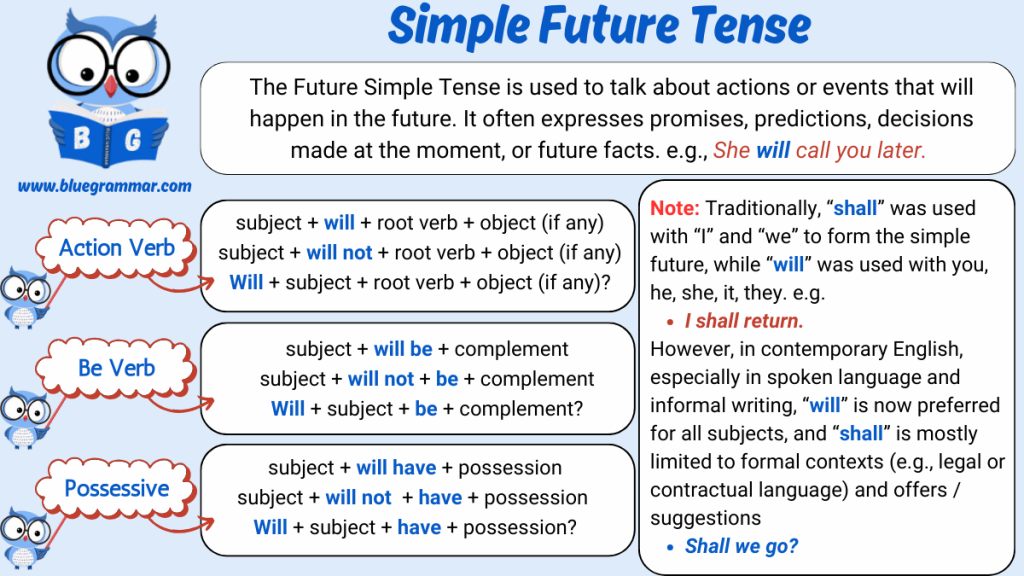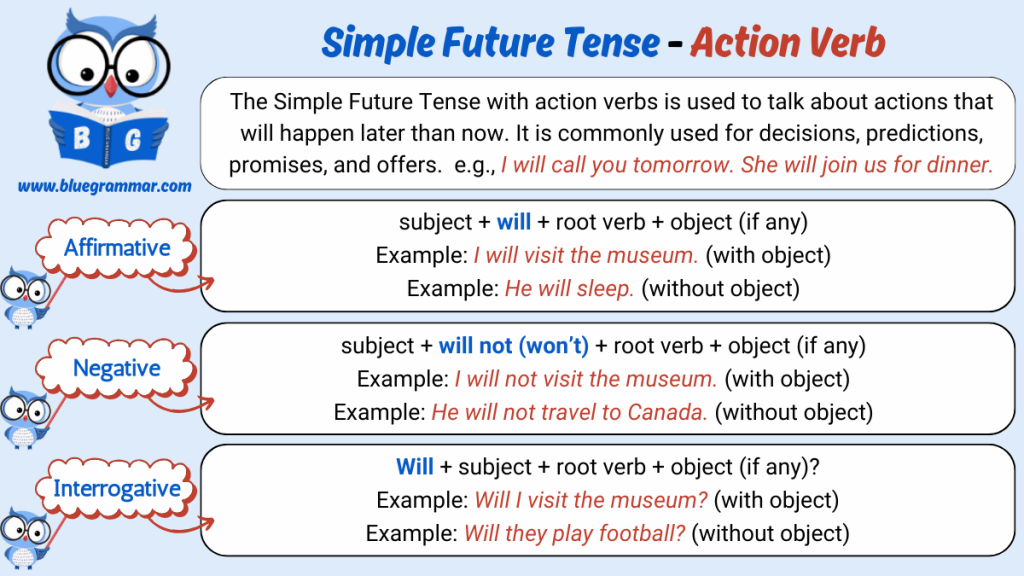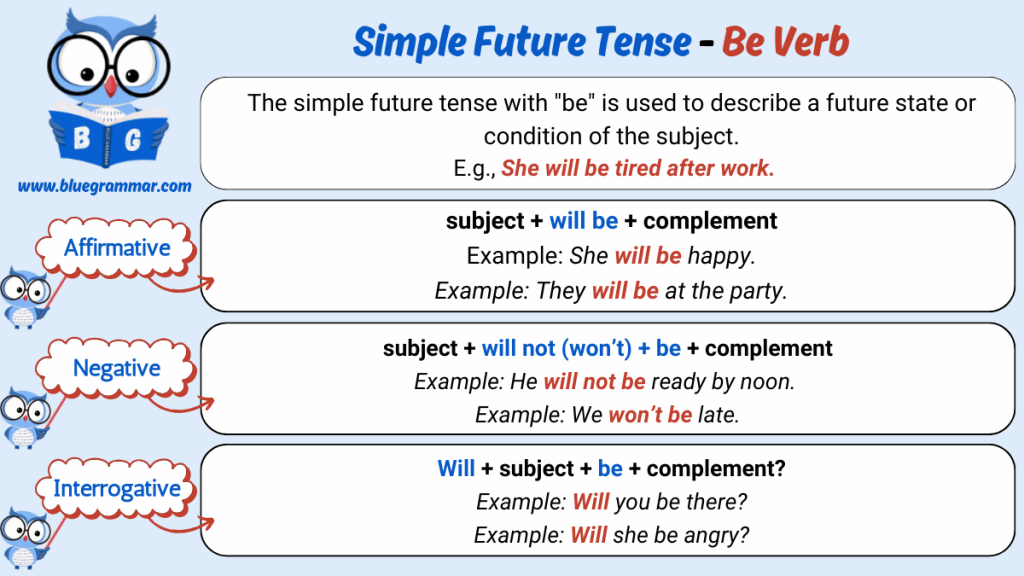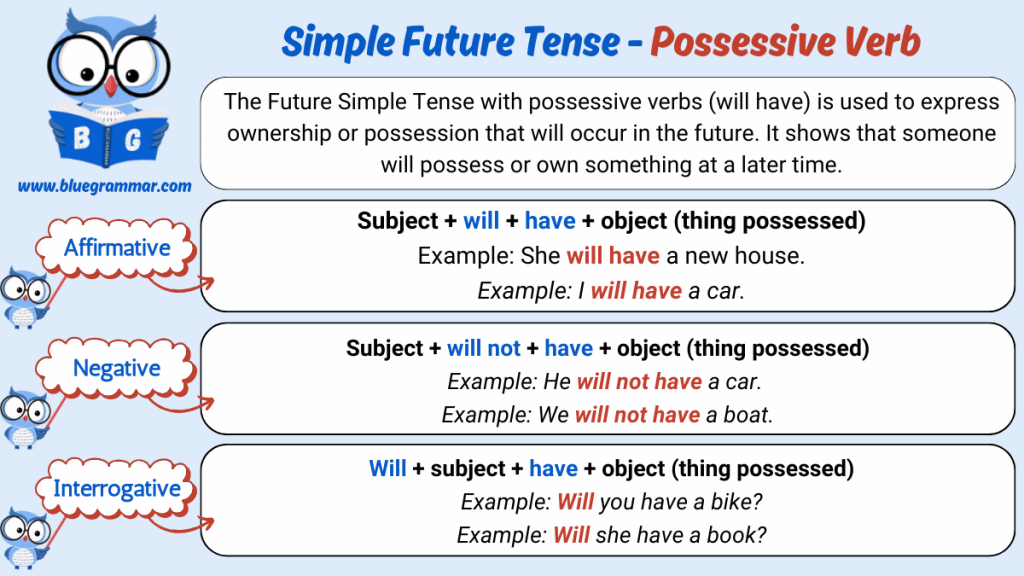
The Future Simple Tense is used to describe actions that will happen in the future. It is the most basic and commonly used tense for talking about things that are yet to occur. Whether it’s a decision made at the moment, a prediction, or a promise, Future Simple helps us talk about them with clarity.
Simple Future Tense : Action Verb
Why We Use Action Verbs in Future Simple Tense?
We use action verbs to show activities or events that will take place in the future. This includes voluntary actions, plans, offers, decisions, or even predictions based on opinion. Action verbs in Future Simple express something that has not started yet, but will occur after now.
This tense is commonly used in:
- Instant decisions made while speaking
- Promises or offers
- Predictions not based on evidence
- Scheduled or expected actions

Structure for Positive Sentences
Subject + will + base form of verb + object/time phrase (if any)
- “Will” is used with all subjects: I, you, he, she, it, we, they.
- Use the base (1st form) of the action verb (e.g., eat, play, work).
Examples:
- I will go to the market tomorrow.
- She will finish the project by Friday.
- They will travel to Lahore next week.
- He will call you later.
- We will study for the test tonight.
- You will meet the manager soon.
- The sun will rise at 6 am.
Structure for Negative Sentences
Subject + will not (won’t) + base form of verb
Examples:
- I will not attend the meeting.
- She won’t join the trip.
- They will not accept the offer.
- He won’t answer your call.
- We will not participate in the event.
Structure for Interrogative Sentences
Will + subject + base form of verb + object/time?
Examples:
- Will you come with us?
- Will she bring the documents?
- Will they help us tomorrow?
- Will we win the match?
- Will he explain everything?
Simple Future Tense : Be Verb
Why We Use Be Verbs in Future Simple?
Be verbs (am, is, are) change to “will be” in the Future Simple. We use “be” to express future states, conditions, or roles rather than actions. It’s useful when talking about how someone or something will be in the future (e.g., happy, tired, a doctor, ready).

Structure for Positive Sentences
Subject + will be + adjective/noun/prepositional phrase
Examples:
- I will be happy to help.
- She will be ready by 5 pm.
- They will be here soon.
- He will be a doctor one day.
- We will be at home tonight.
- You will be fine after some rest.
Structure for Negative Sentences
Subject + will not be (won’t be) + adjective/noun/place
Examples:
- I won’t be busy tomorrow.
- She will not be angry.
- They won’t be in class.
- He will not be late.
- You won’t be alone.
Structure for Interrogative Sentences
Will + subject + be + adjective/noun/place?
Examples:
- Will she be happy?
- Will you be at home?
- Will they be students next year?
- Will he be tired after work?
- Will it be difficult?
Simple Future Tense : Possessive Verb
Why We Use Possessive Verbs in Future Simple Tense?
Possessive verbs like have, own, or possess describe ownership or relationships. In the Future Simple Tense, we use them to talk about things someone will have or own in the future. The verb “have” works as both a stative verb and an action verb, depending on context.
Use “will have” to describe future possession or arrangements.

Structure for Positive Sentences
Subject + will have + noun/object
Examples:
- I will have a new phone next week.
- She will have more time tomorrow.
- They will have a meeting at 10 am.
- He will have three kids in future.
- We will have lunch at 2 pm.
- You will have a good experience.
Structure for Negative Sentences
Subject + will not have (won’t have) + noun/object
Examples:
- I won’t have enough money.
- She will not have time to talk.
- They won’t have the documents.
- He won’t have any issues.
- We will not have a car by then.
Structure for Interrogative Sentences
Will + subject + have + noun/object?
Examples:
- Will she have enough time?
- Will you have lunch with us?
- Will they have new uniforms?
- Will he have his passport?
- Will we have another chance?
Important Notes:
“Shall” can also be used with I and we in formal English instead of “will,” but “will” is more common in modern usage.
- Example: Shall we begin? (formal)
We often use will when making spontaneous decisions or promises.
- I’ll help you with that.
Use “going to” instead of “will” when something is already planned or about to happen. This is different from Future Simple.
- She is going to travel next week. (planned)
Do not confuse Future Simple with Future Continuous:
- Future Simple: I will eat dinner at 8.
- Future Continuous: I will be eating dinner at 8.